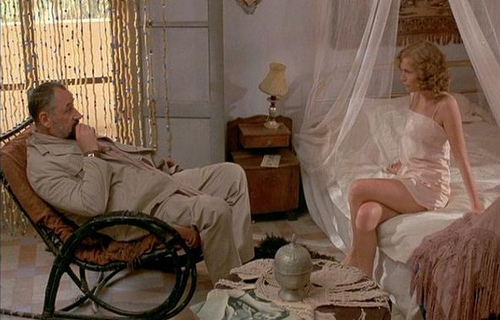Coup de Torchon
Spoilers
I've long been enticed by 1981's COUP DE TORCHON, but my first viewing was only just recently. It was one of the many DVDs I inherited from the vast collection of Harry H., the older gentleman I've spoken of here many times who died last year. He had some very good taste. Lots of classics along with many more lesser known films.
Some of those works of art are shrouded in mystique, their enigmas encouraged by the enthusiastic words of film critics and buffs. A mystique that sometimes evaporates almost immediately when you sit down to watch the movie. Happily, not this time. And....that COUP DE TORCHON was based on a Jim Thompson novel and directed by Bertrand Tavernier made it all the more intriguing for me.
Thompson, a master of printed noir, set his novel Pop. 1280 in West Texas. This adaptation is shuttled to a sweltering, dirty, and racially tense French West Africa in the late 1930s, just before WW 2. It tells the story of a put upon policeman named Lucien (Philippe Noiret) who never makes an arrest, and whose authority is laughed at by the locals, particularly a pair of aggressive pimps who repeatedly humiliate him. His superiors on the force treat him little better. Meanwhile, Lucien's flighty wife (Stéphane Audran) carries on an open affair with their house guest, an idiot named Non who may well be her brother (Eddy Mitchell). Lucien takes the abuse in stride, ineffectually chalking it up to his lot in life. He doesn't seem very swift.
Gradually, we learn more about him. He's been having his own dalliance, involvement with a lusty schoolteacher named Rose (Isabelle Huppert). There is a wellspring of sharp intelligence and perspective to be found within our antihero, cloaked perhaps by a deep sociopathy. A seeming inability to act. Until one day....he begins murdering people. First the 2 pimps, then a series of unfortunates who don't always seem to "deserve" their fates. Lucien's malevolence grows with each chapter of the story, his insight more developed with each crime. Yet, at a critical moment near the end of COUP DE TORCHON, he sits within earshot, helpless to prevent a tragedy. He contorts a face that recognizes a terrible inevitability, then resignation. But was it truly?
Part of the joy of Tavernier's film is not knowing. We never have a complete read on Lucien; often we are baffled by his behavior. Does he only feel life when others perish? Should this film have been titled THE MINUS MAN, much like Owen Wilson's character in a later film? As it is, the title translates in English to CLEAN SLATE, so very apt. Tavernier, co-writing with Jean Aurenche, transforms Thompon's gritty story into more than a dark exercise, layering this deliberate film with what sometimes appears to be Christlike imagery: of crosses, martyrdom, mysterious chalkboard signatures, of solar eclipses, and episodes where intervention seems imminent but then doesn't happen What of the most curious scene, where 2 women watch a movie outdoors from behind the screen, seeing it backwards? The only ones to escape a violent sandstorm that follows? Can we equate Lucien to an omnipresent deity?
COUP DE TORCHON is more colorful and enjoyable than expected. I anticipated a dry morality tale, a harsh, unpleasant photoplay. But this is no mere revenge drama, the kind you enjoy because the "bad guys" get their comeuppance. Lucien suffers the way many filmic antiheroes do, but there is little satisfaction in the aftermath. If I have a criticism, it's that the movie feels more like an essay than a flesh and blood drama. The characters are too obviously meant to represent something rather than be.



Comments